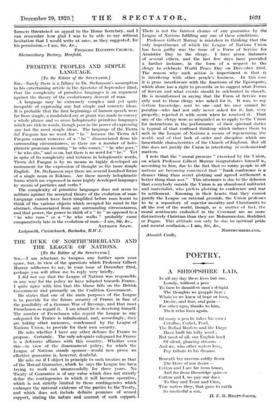THE DUKE OF NORTHUMBERLAND AND THE LEAGUE OF NATIONS.
[To the Editor of The SPECTATOR.] SIR,—I am reluctant to trespass any further upon your space, but, in view of the questions which Professor Gilbert Murray addresses to me, in your issue of December 22nd, perhaps you will allow me to reply very briefly. I did not say that the League of Nations was responsible in any way for the policy we have adopted towards France. I quite agree with him that the blame falls on the British Government and primarily on the Coalition Government. He states that one of the main purposes of the League is to provide for the future security of France in face of the possibility of a German War of Revenge, and that most Frenchmen so regard it. I am afraid he is deceiving himself. The number of Frenchmen who regard the League as any safeguard for France is infinitesimal, and, accordingly, they are taking other measures, condemned by the League of • Nations Union, to provide for their own security. He asks whether I have any other defence for France to propose. Certainly. The only adequate safeguard for France is a defensive alliance with this country. Whether even this—in view of the disarmament policy, for which the League of Nations stands sponsor—would now prove an effective guarantee is, however, doubtful. He asks me if I object in principle to such treaties as that of the Mutual Guarantee, which he says the League has been trying to work out unsuccessfully for three years. No Treaty of Guarantee is of any value which does not strictly define the contingencies in which it will become operative, which is not strictly limited to those contingencies which endanger the national existence of the parties to the Treaty, and which does not include definite promises of armed support, stating the nature and amount of such support.
There is not the faintest chance of any guarantee by the League of Nations fulfilling any one of these conditions.
Professor Gilbert Murray is mistaken in thinking that the only impertinence of which the League of Nations Union has been guilty was the issue of a Form of Service for Armistice Day to the clergy. I have given instances of several others, and the last few days have provided a further instance, in the form of a request to the clergy to celebrate World Pence Day on December 23rd. The reason why such action is impertinent is that it is interfering with other people's business. In this case it is gross interference with the functions of the Episcopate, which alone has a right to prescribe or to suggest what Forms of Service and what events should be celebrated in church. He is misinformed in saying that the Form of Service was only sent to those clergy who asked for it. It was, to my certain certain knowledge, sent to one—and his case cannot be peculiar—who had not only never asked for it, but, very properly, rejected it with scorn when he received it. That any of the clergy were so misguided as to apply to the Union for instructions in the performance of their spiritual duties is typical of that confused thinking which induces them to seek in the League of Nations a means of regenerating the world, and of that lack of order and discipline which arc lamentable characteristics of the Church of England. But all this does not justify the Union in interfering in ecclesiastical matters.
I note that the " moral pressure " exercised by the Union, on which Professor Gilbert Murray congratulates himself is, according to him, due to the fact that so many people in all nations are becoming convinced that " frank conference is a cleaner thing than secret plotting and agreed settlement a better thing than war." This utterance is due to the delusion that everybody -outside the Union is an abandoned militarist and materialist, who prefers plotting to conference and war to settlement. Knowing in their hearts that they cannot justify the League on rational grounds, the Union professes to be a repository of superior morality and Christianity to all the rest of the world, though, as a matter of fact, tFe moral sentiments embodied in the Covenant are no more distinctively Christian than they are Mohammedan, Buddhist or Pagan. This attitude can only lat due to spiritual pride and mental confusion.—I am, Sir, &c.,
Almvick Castle.
NORTHUMBERLAND.


































 Previous page
Previous page